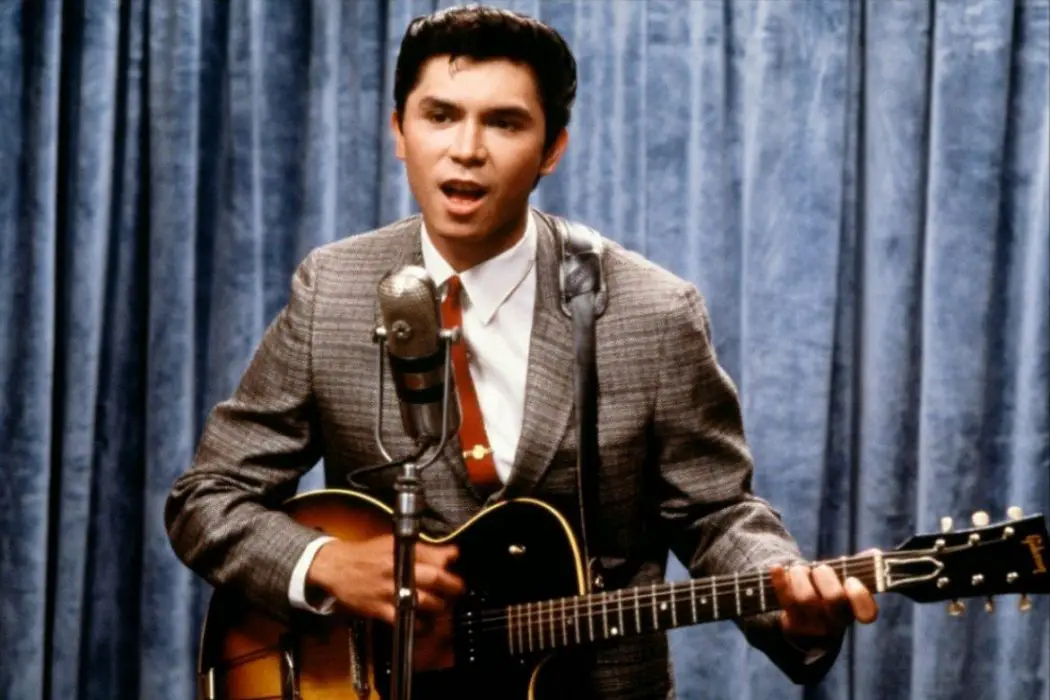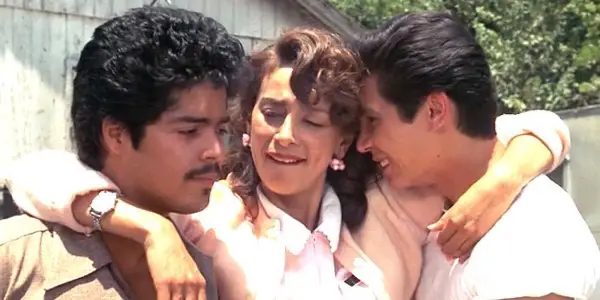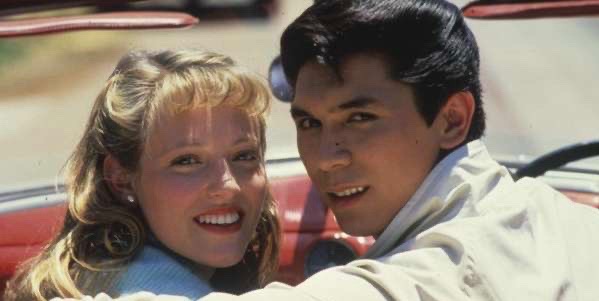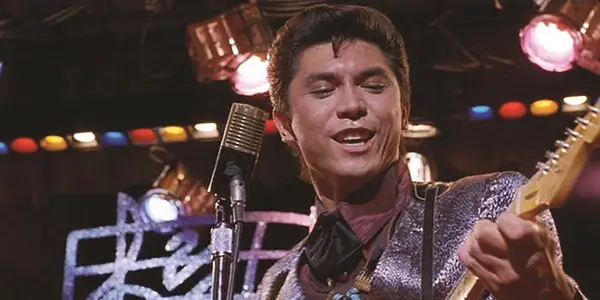LA BAMBA: The Rise Of Ritchie Valens

Bree is a journalism major living in Toronto. She is…
Discovering new music in the most unconventional ways is something I live for. I’m also a sucker for biopics about musicians, so imagine my delight when I came across La Bamba in my Netflix suggestions. Originally released in 1987, La Bamba is about Ritchie Valens (born Richard Steven Valenzuela), an influential Chicano rock ‘n’ roll star who lived a short but inspiring life.
Directed by Luis Valdez, La Bamba tells the story of Valens’ rise to fame in the late fifties. The film features a dysfunctional, yet compassionate family, a teenage romance to make your heart melt, and the purest love for music.
Chasing the Dream
The film opens with a horrific plane crash above a schoolyard, where children are playing. Ritchie, played by a young Lou Diamond Phillips, awakes with a start, signifying the crash was simply a nightmare, fuelled by his fear of flying. Eventually, it is revealed the film’s strategy for foreshadowing Ritchie’s untimely passing is through these constant nightmares, which act as a warning. It sparks unnerving anticipation for the film’s ending. Despite being on edge with this knowledge tucked inside the corner of your brain, the film establishes an immersive atmosphere.

The Valenzuelas are whisked off to Southern California for a fresh start when Ritchie’s half-brother Bob (Esai Morales) rides in on his motorcycle after a stint in jail. The close bond built between Ritchie and his brother Bob is palpable, encouraging an earnest connection onscreen. Once in California, Ritchie’s life is turned upside down when he plans to make his big break in the music biz, with the help of Bob Keane (Joe Pantoliano), a music producer for Del-Fi Records.
The film also expertly portrays Ritchie’s relationship with a girl named Donna Ludwig (Danielle von Zerneck). Their relationship blossoms quickly. Amazingly enough, Ritchie’s high school sweetheart inspired “Donna”, an emotional and romantic ballad of Ritchie’s love for her, which happened to be his highest-charting single.
Despite Valens being ready to take on the world, he is faced with the trials of a teenage life. Love, loss, family troubles. This component of the film shows how Ritchie overcame the obstacles he faced; while becoming legendary for his pure talent and love for music. The electrifying persona that Phillips displays no doubt matches the energy Valens’ would have had in his own performances.
The film is a respectable biopic, showing Ritchie Valens’ path to fame, while also addressing issues of domestic disputes, racism, and elitism. When the final scenes of the film, and Ritchie’s life, come to an end, the story is wrapped up with a heartfelt phone conversation between Bob and Ritchie, where they vow to meet each other at Ritchie’s next show. He never made it. His plane crashed on February 3rd, 1959, also known as The Day the Music Died.

La Bamba was released in the era of Hispanic Hollywood, and with its success marked a turning point for mainstream film. Under Valdez‘s direction, the film was created as an expression of the American Dream while embracing the rise of films featuring more diverse ethnic backgrounds. Valdez valued history just as much as cinematics when it came to La Bamba, and most of the filming was done in San Fernando Valley to portray a realistic story.
How La Bamba Influences Musical Taste
In general, music in movies is monumental in setting the mood or tone. Music, obviously, is especially critical in biopics focused around musicians. La Bamba may not have featured Ritchie Valens’ original music, but the band Los Lobos did an incredible job portraying Valens’ sound and David Hidalgo sang in place of Phillips.

Some of my favourite scenes included the sentimental phone booth call Ritchie made to Donna after they couldn’t see each other anymore, where he sang her “Donna” for the first time. The scene played out with passion and longing, making it a perfect ballad for young love.
La Bamba, the title of the film and one of Valens’ adaptations that made early rock ‘n’ roll history, was also a spectacular on-screen performance. It was at the height of Valens’ career, playing in front of a large audience, with so much enthusiasm. It shapes the highlights of his journey to rock ‘n’ roll fame.
After watching the film, I had Ritchie Valens’ album on repeat everywhere I went, most of his songs becoming an uplifting part of my morning or a lazy afternoon addition. I greatly appreciate any instance that I find new or old music to experience, and this film gave me an opportunity to enjoy music originating from decades before my time. I find it intriguing that we find ourselves so often influenced by film and how music within these films carries the tune all the same.
Conclusion: La Bamba
La Bamba is a well-versed depiction of Ritchie Valens’ life, and it is evident a tremendous amount of care was put into the production of this film. It portrayed Valens as an honest and vibrant musician who was gone too soon. Furthermore, since life proves to be fleeting, I find it important to preserve these rare occasions where we are so inspired by film culture or music we have never heard before.
Ritchie’s music was conserved by his family for the world to enjoy, and his incredible story was portrayed wonderfully, giving an insight that many have the fortune to experience. Not only did I find a film that I loved, but I discovered a new chunk of rock ‘n’ roll that inspired me enough to write about it, and hopefully, this article entices you enough to give Ritchie Valens a listen as well.
Have you ever discovered music through film? Let us know in the comments below!
La Bamba is available for streaming on Netflix.
Does content like this matter to you?
Become a Member and support film journalism. Unlock access to all of Film Inquiry`s great articles. Join a community of like-minded readers who are passionate about cinema - get access to our private members Network, give back to independent filmmakers, and more.
Bree is a journalism major living in Toronto. She is a passionate cinephile with a love for 70’s music and can be found in any nearby bookstore. Bree aspires to travel and share her love of story telling while embracing inclusivity in her writing.












